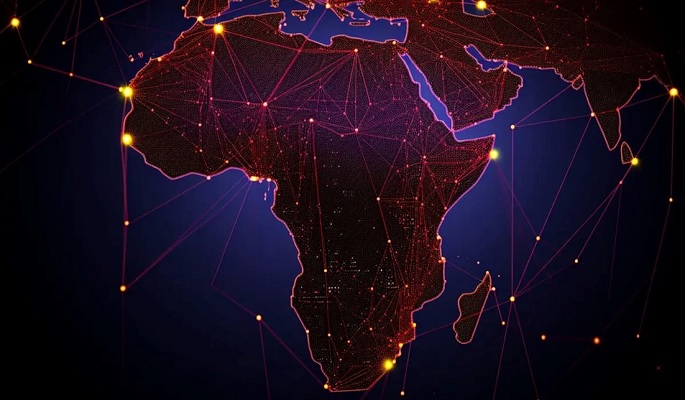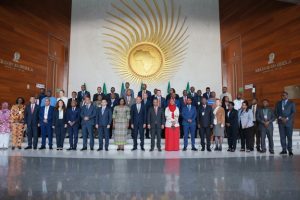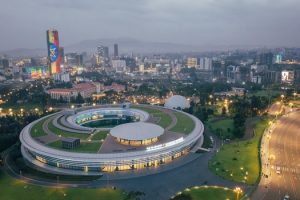
African leaders were gathered in Addis Ababa to attend the 38th Ordinary Session of the Assembly of Heads of State and Government of the African Union (AU), held from February 15 to 16, at the Headquarters of the AU. Days before the 38th leaders’ summit, the 46th Ordinary Session of the African Union Executive Council was organized at the AU hall on Wednesday and Thursday. During both sessions, leaders of the continent discussed various continental issues with the vision of building a prosperous, peaceful, and integrated Africa.
Different speakers raised the necessity of promoting and harnessing technological development during the two sessions as well as during the eighth Africa Business Forum, held following the conclusion of the AU Summit in Addis Ababa. Especially, concerns were raised about the fast development and unpredictability of emerging technologies, such as Artificial Intelligence (AI). Officials who addressed the issue during the sessions underscored the critical role of technology in accelerating the continent’s journey toward achieving Agenda 2063.
Despite Africa’s untapped potential with an abundance of natural resources, low technological development coupled with political instability and poor infrastructural networking affected the continent’s development. In 2013, while the continent celebrated its 50th anniversary of the formation of the Continental Union, AU, it launched the AU Agenda 2063, a continental ambitious strategic plan of realizing continental prosperity by 2063, to celebrate AU’s centenary in a well-developed and integrated continent.
However, with the traditional continental trend, realizing AU’s Agenda 2063 seems tough unless the ambition is supported with technological innovations. Without changing the ‘business as usual’ trend, defeating poverty and realizing continental prosperity is something beyond achievable. As the world is entering into the Fourth Industrial Revolution, characterized by the development of new technologies like AI, robotics, and IOT, achieving Africa’s prosperity is unthinkable without strategic investments in the technology sector.
Africa remains behind during the first, second, and third industrial revolutions. As a result, the continent remains poor and dependent on the industrialized world. Now, Africa is struggling for self-reliance and set an ambitious continental plan of achieving prosperity. Hence, promoting and developing technology in the continent is not an option but a necessity for Africa to realize its vision. Making Africa part of the Fourth Industrial Revolution is not enough, Africa should play the leading role in the Fourth Industrial Revolution, as the continent has immense and untapped potential interims of natural resources as well as human resources.
Without strategic investments in technological development and innovation in the continent, realizing sustainable growth, competitiveness and economic transformation is difficult for Africa during the fourth industrial revolution in every sector. Ethiopian Foreign Minister Gedion Timothewos (PhD) said during the opening session of the 46th Executive Council of the AU that achieving the Agenda 2063 demands doubling the current efforts of the continent. He underlined the importance of adopting technology in every sector to accelerate the development endeavors of Africa.
For Gedion, technological advancements, such as AI and other emerging technologies in the digital sector, becomes a threat and opportunity, which depends on the response of the continent on how to use these developments for the benefit of Africa. “The coming wave of change could either lift us all to a better position or through us into the unknown,” Gedion remarked. This indicated that the way of handling the technological developments could either lift Africa to a better position of throw the continent into a difficult position.
Hence, as technology is becoming more and more sophisticated and its impact on development grows over time, Africa should prioritize developing and promoting technological innovations of the continent to realize the continental development vision. As the AU Agenda 2063 eyes transforming Africa and making the continent a global powerhouse of the future, technology would play a vital role in realizing this ambitious vision of the continent.
Speaking at the opening session of the 38th AU Summit, the outgoing African Union Commission (AUC) Chairperson, Moussa Faki Mahmat said that “Africa’s story has long been one of a paradox: a continent endowed with immense natural and human resources yet constrained by economic fragmentation and underdevelopment,” which he underlined to the necessity of changing this fate of Africa. For him, the time to rewrite Africa’s narrative is today by exploiting the untapped potential to make Africa a global powerhouse of production, innovation, and economic self-sufficiency. Africa has “the means to do so,” the outgoing commissioner said underlining the necessity of investing in technological innovation to accelerate Africa’s development endeavors, in addition to maintaining peace and security of the continent.
According to Moussa Faki Mahamat, with a single market of 1.5 billion people and a combined GDP exceeding US$3 trillion, the African Continental Free Trade Area (AfCFTA) offers the continent the blueprint for continental transformation. However, he said, “a blueprint alone is not enough.” “At the heart of the transformation lies Africa’s greatest asset – its people, particularly its youth.”
Despite over 60% of Africa’s population being under the age of 25 with the world’s largest and fastest-growing youth demography, he stated, millions of young people in Africa remain unemployed or underemployed. The chairperson stated that maintaining this status quo and achieving continental prosperity is tough. “We must create sustainable jobs by leveraging regional value chains, empowering youth-led enterprises, and harnessing digital innovation.”
Speaking at the opening session during the eighth Africa Business Forum on Monday, Executive Secretary of the United Nations Economic Commission for Africa (ECA), Claver Gatete, for his part stressed the need to harness innovation, technology, and entrepreneurship to shape Africa’s future. According to Gatete, innovation and technological development are crucial to accelerate as well as realize Africa’s development.
For the Executive Secretary, Africa “can no longer afford to export raw commodities and import finished products. An Africa that prospers embraces industrialization, champions’ value addition and advances regional integration.” For him, Africa “should strengthen public-private partnerships to drive innovation and entrepreneurship, accelerate digitalization and technology adoption, and position Africa as a leader in the Fourth Industrial Revolution.” Gatete further noted that with targeted policies, innovative financing mechanisms, and strategic partnerships across the continent and harnessing technology in every sector, there is an opportunity for Africa to unlock the continent’s full economic potential and realize the continental vision of Agenda 2063.
In the era of the Fourth Industrial Revolution, defined by technological developments in cyber-physical systems such as high internet connectivity, new human-machine interaction modes virtual reality systems; and improvements in digitalization, economic development becomes more dependent on emerging technologies. Considering the emerging wave of changes in the technology sector, especially in digital technology, Africa should focus on harnessing technology to accelerate its economic development.
Africa’s struggle is ensuring self-reliance in every sector. In today’s world, transforming every sector becomes dependent to technological innovations. To ensure self-sufficiency as well as compete in the international market, promoting technology and innovation should become among the top agendas of Africa. Africa should intensify technological revolution to realize the continental dream of defeating poverty and ensuring prosperity.
BY DARGIE KAHSAY
THE ETHIOPIAN HERALD FRIDAY 21 FEBRUARY 2025




